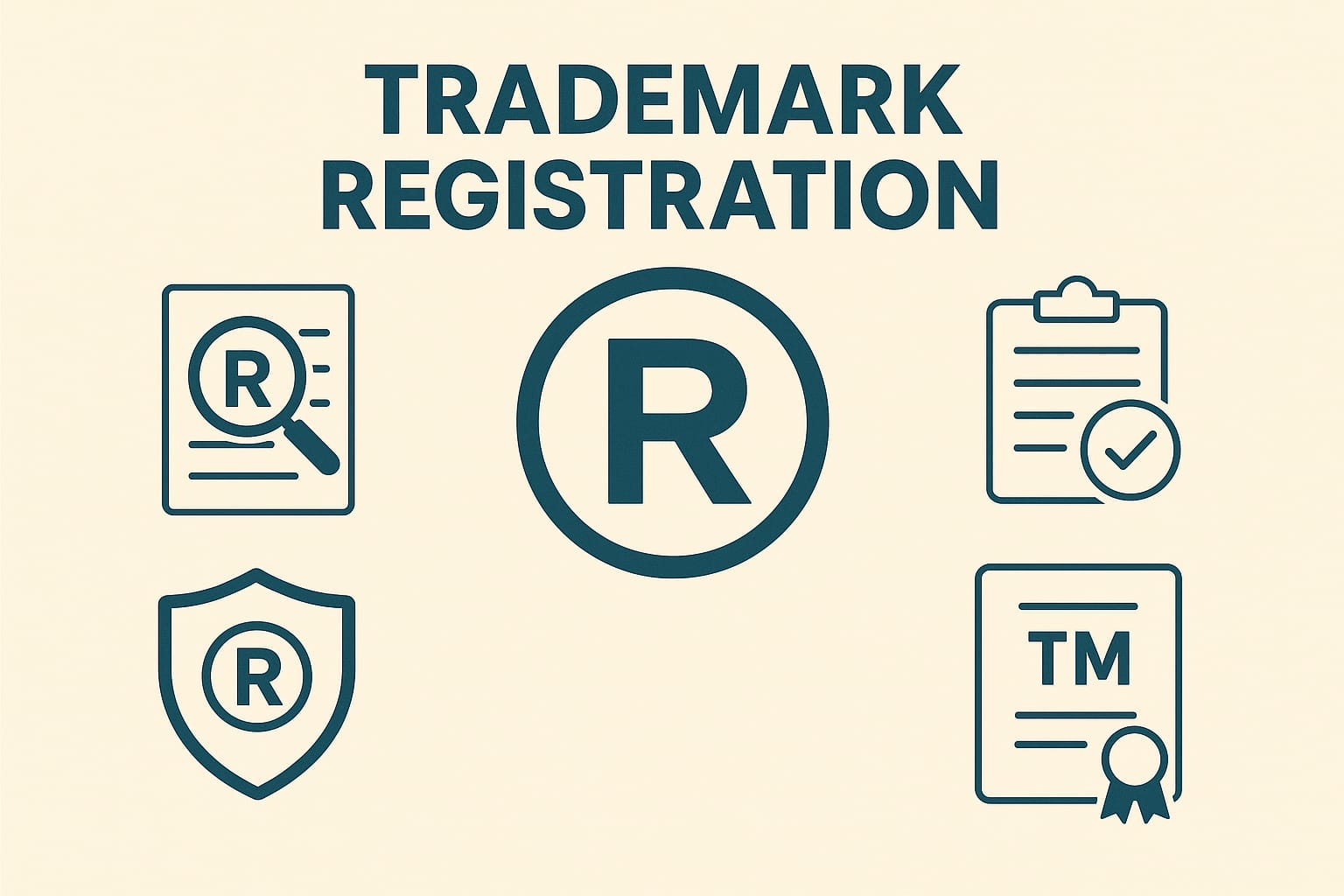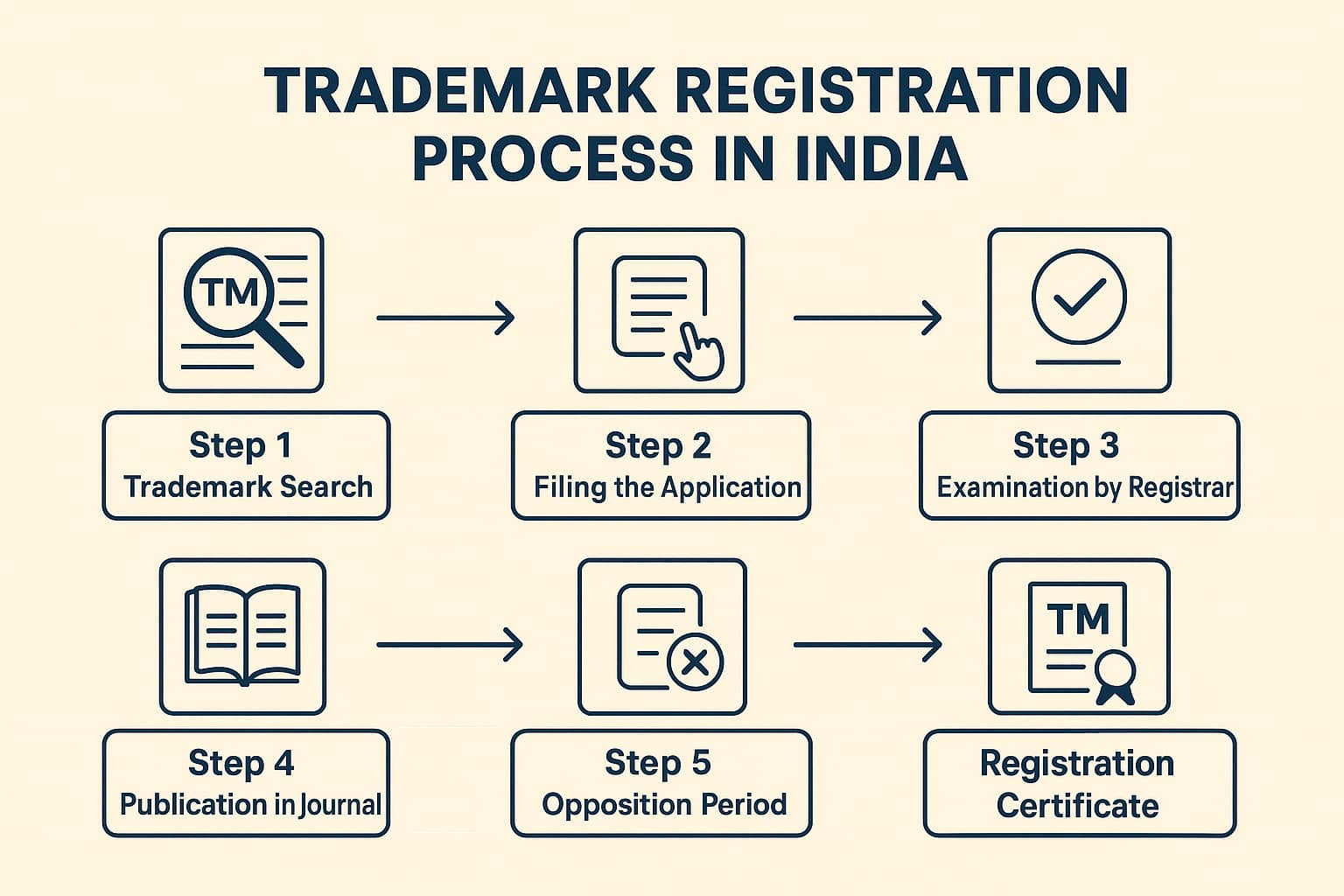Trademark Registration in India: Complete Guide to Protecting Your Brand
India’s startup ecosystem is booming, and with new businesses launching daily, protecting your brand has never been more crucial. A registered trademark in India gives your business legal rights over your brand name, logo, tagline, or symbol.
Table of Contents
Introduction to Trademark Registration in India
Every brand has an identity. Think of names like Amul, Tata, or Infosys — they are more than just companies; they are trusted brands. What protects them from being copied? The answer is trademark registration.
In India, trademark registration under the Trade Marks Act, 1999 ensures exclusive rights to use your brand name, logo, or slogan. For entrepreneurs, startups, and established businesses, understanding this process is vital.
This article will walk you through every detail—from what a trademark is to how to deal with objections and opposition, ensuring even a novice can grasp the entire process.

What is a Trademark in India?
Definition and Purpose
A trademark is a unique identifier—it can be a word, phrase, symbol, logo, sound, or combination—that helps consumers recognize your product or service. It prevents market confusion and ensures your brand stands out.
Types of Trademarks
- Word Marks – Names or slogans (e.g., Infosys).
- Logos & Symbols – Graphic identities (e.g., Airtel curve).
- Sound Marks – Distinct tunes (e.g., Nokia ringtone).
- Shape Marks – Product shapes (e.g., Coca-Cola bottle).
Why Trademark Registration is Important
Legal Protection
Registered trademarks give you exclusive rights and allow you to take legal action against infringers.
Brand Recognition
A strong brand builds trust. Customers recognize registered marks as more reliable.
Business Growth
A registered trademark enhances company valuation and helps in franchising or international expansion.
Trademark Public Search: First Step Before Applying
Before filing, it’s crucial to ensure your trademark is unique.
How to Do a Trademark Search
- Visit the official IP India Trademark Search Portal.
- Enter your proposed wordmark or logo.
- Select the relevant class (out of 45 classes).
- Review results for identical or similar marks.
Why MCA Master Data Check is Important
Apart from the IP portal, you should also check the MCA Master Data to see if your trademark conflicts with registered company or LLP names.
Example: If your proposed brand name matches an existing company’s registered name, it may cause rejection or legal disputes later.
Trademark Registration Process in India

Step 1: Filing the Application
- File online through the IP India e-filing portal.
- Use Form TM-A.
- Attach trademark details, applicant information, and relevant documents.
Step 2: Examination by Registrar
The Registrar examines the application for uniqueness, legality, and compliance.
Possible outcomes:
- Accepted: Moves to journal publication.
- Objected: Registrar issues an examination report.
👉 How to Respond to Objections:
- File a reply within 30 days.
- Justify distinctiveness, submit evidence of use, or modify the mark.
- If unsatisfied, the Registrar may schedule a hearing.
Step 3: Publication in Trademark Journal
If accepted, the mark is published in the Trademark Journal for public opposition.
Step 4: Opposition by Third Parties
- Any person can file an opposition within 4 months of publication.
- Both parties submit evidence and attend hearings.
- The Registrar gives a final verdict.
👉 If Opposition Arises:
- You must file a counter-statement within 2 months.
- Evidence is exchanged, followed by oral hearings.
- The Registrar decides whether to approve or reject the application.
Step 5: Registration
If no opposition or successful defense, the Registrar issues a Trademark Registration Certificate. You can now use the ® symbol.
Documents Required for Trademark Registration
For Individuals
- PAN & Aadhaar card
- Address proof
- Logo (optional if wordmark only)
For Companies/LLPs
- Certificate of Incorporation
- Company PAN card
- Registered office proof
- Power of attorney (if agent files)
Common Mistakes to Avoid
- Choosing generic names like “Best Electronics” (likely to be rejected).
- Filing under the wrong class of goods/services.
- Skipping a public search before applying.
Cost of Trademark Registration in India
- Individuals/Startups/Small Enterprises: ₹4,500 per class (online filing).
- Companies: ₹9,000 per class.
- Attorney Fees: Additional (optional).
- Renewal Fees: ₹9,000 every 10 years.
Timeframe for Trademark Registration
- 6–18 months for approval (if no objection or opposition).
- You can use ™ symbol immediately after filing.
- Use ® symbol only after registration certificate is issued.
International Trademark Registration
Indian businesses can apply for protection abroad through:
- Madrid Protocol – Covers 120+ countries.
- WIPO – World Intellectual Property Organization.
Trademark Renewal and Maintenance
- Valid for 10 years.
- Renewable indefinitely in 10-year blocks.
- Must renew within 6 months of expiry.
Difference Between Trademark, Copyright, and Patent
- Trademark – Protects brand identity.
- Copyright – Protects creative works.
- Patent – Protects inventions.
Trademark Infringement in India
Identifying Infringement
If another party uses your mark in a way that confuses customers, it’s infringement.
Legal Remedies
- Cease-and-desist notices
- Civil/criminal action under the Trade Marks Act
- Monetary damages
Digital Age Trademark Protection
- Register your domain names matching your brand.
- Secure your brand on social media.
- Monitor e-commerce platforms for misuse.
FAQs on Trademark Registration in India
Q1. How long does a trademark last?
10 years, renewable indefinitely.
Q2. Can I apply myself?
Yes, but a lawyer increases approval chances.
Q3. What happens if objections arise?
You must reply within 30 days; if unsatisfied, hearings are scheduled.
Q4. Can someone oppose my mark?
Yes, within 4 months of journal publication.
Q5. Why is MCA name check important?
To avoid conflicts with existing companies/LLPs.
Q6. Can I trademark both name and logo?
Yes, but separate applications are required.
Conclusion: Securing Your Brand in India
Trademark registration in India is not just a legal formality—it’s a strategic business step. From filing and handling objections to defending oppositions, every stage requires careful attention.
By doing a public search, checking MCA company names, and responding to objections wisely, you can secure your brand identity and grow confidently.
👉 For official guidelines, visit the IP India Trademark Portal.
For our Consultation regarding Trademark Registration connect through Mob: 9037373311 or visit Ravel Advisors Services Section